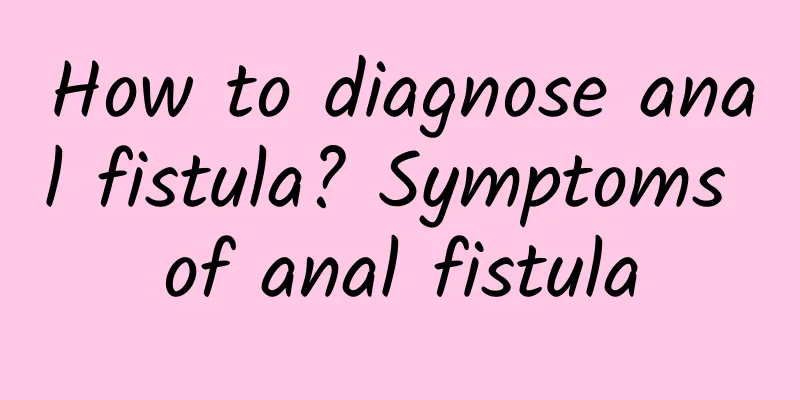How to diagnose anal fistula? Symptoms of anal fistula

|
Anal impotence is a common rectal and anal disease in clinical practice, which has a great impact on people's lives. The main symptom of anal impotence is pus discharge. If anal impotence is not treated in time, it may be accompanied by some systemic symptoms. For example, anemia. Surgery can treat anal impotence. 1. Pus In the early stages of anal fistula, there is a lot of pus discharge, which is yellow and thick, and has a strong fecal odor. Over time, the pus gradually decreases, sometimes appears and sometimes disappears, and becomes as thin as water. If you are too tired, the pus increases and feces may flow out. Newly formed fistulas discharge more pus, which is thick, yellow and smelly. Fistulas that have been in operation for a long time will discharge relatively less pus, or the pus may be absent sometimes and thin like water. If the amount of pus increases, it means that a new fistula has been formed. The fistula is sometimes temporarily blocked and pus is not discharged, resulting in local swelling and pain and increased body temperature. Later, the blocked fistula will rupture and pus will be discharged again. Gas or feces may also be discharged from the fistula. 2. Pain When anal fistula is unobstructed, there is generally no pain, only a local feeling of heaviness and distension. However, it may also cause pain due to a large internal opening and the flow of feces into the tube, especially when defecating or when there is inflammation. When the fistula is unobstructed and there is no inflammation, there is often no pain, only local swelling and discomfort, which worsens when walking. When the fistula becomes infected or pus is not draining properly and becomes swollen and inflamed, it can cause pain. Internal fistula often causes burning discomfort in the lower rectum and anus, and pain when passing stool. 3. Itching The constant irritation of the skin around the anus by pus can cause perianal pruritus, which may also be accompanied by perianal eczema. 4. Systemic symptoms Acute inflammation or chronic complex anal fistula may be accompanied by systemic symptoms such as fever, anemia, weight loss and loss of appetite. During the acute inflammatory period and when complex anal fistulas recur, fever of varying degrees may occur, or long-term chronic wasting symptoms such as weight loss, anemia, and physical weakness. Anal fistula cannot heal on its own and requires surgical treatment. |
<<: The dangers of anal fistula, you must know
>>: I get a headache when the wind blows. Do you know why?
Recommend
Diet therapy for high blood pressure
Hypertension is a very common disease among many ...
Dosage and administration of Lancome for the treatment of anxiety disorders
Lanshi, also known as fluvoxamine maleate tablets...
Is lymphoid follicle hyperplasia pharyngitis? How to treat it?
Lymph follicular hyperplasia is one of the sympto...
The efficacy of aged dried radish
Aged dried radish can help improve weak gastroint...
Can I brush my teeth the next day after tooth extraction? Dentists recommend this
Because oral problems are not taken seriously by ...
Ginsenoside RG3 efficacy
Ginsenoside Rg3 is a rare ginsenoside currently w...
What are the precautions for cupping yourself?
Everyone loves beauty, especially nowadays many y...
There is a small meat ball in the lip
A small lump growing in the lip may be caused by ...
Can cactus cure stomach problems?
The treatment of stomach problems relies on 30% t...
Can pregnant women drink black sesame soy milk?
Black sesame soy milk is more beneficial for preg...
Characteristics of cancer cells
Cancer cells are characterized by their clonal na...
What medicine is effective for fever and cold?
The symptoms of heat cold are relatively serious....
What medicine should I take if I catch a cold after being caught in the rain?
No matter what season it is, you may catch a cold...
What to do if you strain your hamstring? What are some quick recovery methods?
Tight tendon strain is very common, because when ...
Why does it hurt when you press on the lower part of a woman's belly button?
Some women will feel pain when pressing below the...









